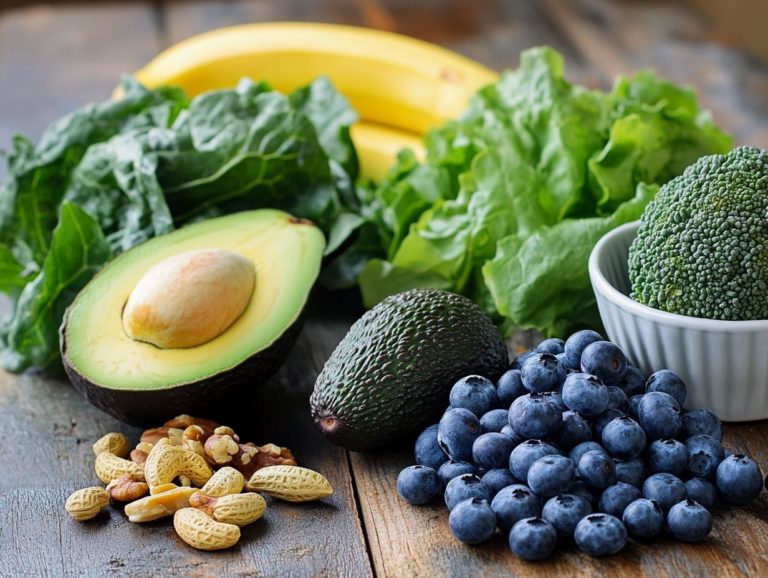How Whole Foods Provide Essential Nutrients
Whole foods serve as the cornerstone of a nutritious diet, providing a rich array of essential nutrients that processed foods typically lack.
Rich in vital vitamins and minerals, these natural choices elevate your nutritional intake and play a significant role in lowering the risk of chronic diseases.
In this article, you’ll uncover the numerous advantages of incorporating whole foods into your meals, along with practical strategies for effective meal planning and preparation. It also dispels common misconceptions surrounding these wholesome options.
Embrace the power of whole foods they can redefine your health journey!
Contents
- Key Takeaways:
- Nutrients Found in Whole Foods
- Benefits of Consuming Whole Foods
- Incorporating Whole Foods into Your Diet
- Common Misconceptions about Whole Foods
- Frequently Asked Questions
- 1. How do whole foods provide essential nutrients?
- 2. What types of whole foods are good sources of essential nutrients?
- 3. Why are whole foods considered a better source of essential nutrients compared to processed foods?
- 4. How do whole foods provide a more balanced intake of essential nutrients?
- 5. Can whole foods provide all the essential nutrients our bodies need?
- 6. Are there any specific whole foods that are particularly high in essential nutrients?
Key Takeaways:

Whole foods are unprocessed and contain essential nutrients like vitamins and minerals that support overall health and well-being. Including whole foods in your diet improves nutritional value and reduces the risk of chronic diseases. Incorporate whole foods into your meals through proper meal planning and preparation, and debunk any misconceptions about their benefits.
What are Whole Foods?
Whole foods are your ticket to a more vibrant life, showing off minimally processed foods that retain their natural nutrients, texture, and flavor. In contrast to processed foods, which often come laden with added sugars, unhealthy fats, and artificial ingredients, whole foods include fruits, vegetables, whole grains, nuts, seeds, and legumes.
Embracing these foods aligns you with the Healthspan Initiative, creating better eating habits and enhancing your dietary patterns for a more nutritious lifestyle.
The essence of whole foods lies in their nourishing qualities. They are brimming with vitamins, minerals, and fiber that promote optimal digestion and metabolic health. Unlike their processed counterparts, often filled with preservatives and empty calories, whole foods bolster your immune system and lower the risk of chronic diseases.
Include examples such as:
- Berries
- Kale
- Quinoa
- Avocados
These not only elevate the quality of your meals but also serve as versatile ingredients for a myriad of culinary delights. By integrating whole foods into your daily routine, you foster mindful eating and cultivate a deeper connection with your dietary choices, paving the way for a more vibrant and energetic existence.
Nutrients Found in Whole Foods
Whole foods are treasure troves of essential nutrients, brimming with vitamins, minerals, dietary fiber, antioxidants, and phytochemicals natural compounds found in plants that have health benefits.
Each of these components plays a vital role in enhancing your health and warding off chronic diseases. The nutritional value you gain from whole foods is unmatched when compared to their processed counterparts, establishing them as a cornerstone of a truly healthy diet.
Key Vitamins and Minerals
Key vitamins and minerals found in whole foods, such as Vitamin C, potassium, calcium, and iron, are essential for maintaining various bodily functions from boosting your immune system to supporting bone health.
These nutrients are often abundant in fruits, vegetables, and legumes, contributing significantly to the overall health benefits associated with a diet rich in whole foods.
For instance, Vitamin C, found in citrus fruits and bell peppers, is crucial for collagen production and enhances your body s ability to absorb iron, ultimately increasing your energy levels and overall vitality.
Potassium, located in bananas and sweet potatoes, helps regulate blood pressure and balance fluids in your body, promoting cardiovascular health. Similarly, calcium, plentiful in leafy greens and fortified plant-based milks, is vital for maintaining strong bones and teeth. Iron, sourced from beans and lentils, is pivotal for transporting oxygen throughout your bloodstream.
By incorporating these nutrient-dense foods into your daily meals, you not only support optimal health but also foster a more vibrant lifestyle. Don t wait! Start your journey with whole foods today!
Benefits of Consuming Whole Foods

Consuming whole foods provides a wealth of health benefits, from enhanced nutritional value to a significantly reduced risk of chronic diseases like heart disease and type 2 diabetes.
By prioritizing whole foods in your diet, you can elevate your overall well-being and cultivate a vibrant, healthy lifestyle. Embracing these natural choices nourishes your body and supports a future filled with vitality.
Improved Nutritional Value
The enhanced nutritional value of whole foods comes from their abundant fiber, antioxidants, and essential nutrients, often lost in processed options. This promotes digestive health and supports a healthier body, aligning perfectly with the goals of the Healthspan Initiative.
These natural choices help you maintain optimum weight through increased satiety and play a vital role in preventing chronic diseases. For instance, a study published in the American Journal of Clinical Nutrition found that individuals on high-fiber diets are 30% less likely to develop heart disease than those who prefer processed foods.
Antioxidants in fruits and vegetables effectively combat oxidative stress, a contributing factor to age-related diseases. By choosing whole foods, you contribute significantly to your long-term health and wellness.
Reduced Risk of Chronic Diseases
A diet rich in whole foods can significantly lower your risk of chronic diseases, such as cardiovascular issues, obesity, and type 2 diabetes. Embracing a whole-foods diet is essential for your long-term health.
By making mindful food choices, you can greatly reduce your risk of these common conditions. Research from esteemed institutions like Harvard University shows that consuming a diverse range of fruits, vegetables, whole grains, and lean proteins not only aids in weight management but also enhances your metabolic health.
Whole foods are packed with essential nutrients and antioxidants that fight inflammation, a major contributor to chronic diseases. Studies indicate that those who follow a plant-based whole-foods diet may enjoy lower cholesterol levels and better blood sugar control.
Fiber found in whole foods supports digestion and nurtures a healthy gut microbiome, further boosting your overall well-being. It’s clear that incorporating these nutrient-dense foods into your diet plays a crucial role in protecting your health.
Incorporating Whole Foods into Your Diet
Incorporating whole foods into your diet can transform your health for the long term! You can accomplish this with thoughtful meal planning and savvy grocery selections.
By prioritizing these nutrient-rich foods and recognizing their nutritional value, you empower yourself and your family to cultivate sustainable, healthy eating habits.
Tips for Meal Planning and Preparation

Effective meal planning and preparation are essential strategies for making whole foods a staple in your diet, helping you adhere to a healthy lifestyle. Planning your meals in advance and incorporating a variety of whole foods enhances both the flavor and nutritional value of your dishes.
Opt for fresh fruits, vegetables, whole grains, nuts, and legumes to create diverse meal options that truly nourish your body. For example, using seasonal vegetables not only boosts the nutrient profile but also adds vibrant colors and exciting textures to your meals.
Designating a weekly meal prep day can be incredibly beneficial. During this time, batch-cook grains like quinoa or brown rice, roast a medley of vegetables, and prepare protein sources such as grilled chicken or lentils.
This approach allows you to mix and match ingredients throughout the week, sparking creativity in the kitchen while keeping healthy options within easy reach.
Common Misconceptions about Whole Foods
Even with extensive evidence highlighting the advantages of whole foods, many misconceptions persist, leading individuals to make less-than-ideal food choices often opting for processed foods instead of nourishing, nutrient-dense alternatives.
Understanding the realities behind these myths not only empowers you but also contributes to a broader culture of healthy eating and informed nutritional choices.
Start incorporating whole foods into your meals today to experience their immediate benefits!
Debunking Myths and Clarifying Facts
Many myths surround whole foods, such as the belief that they re always pricier than processed options or that they require elaborate cooking skills. These misconceptions need to be debunked to help you make healthier food choices.
For example, you might worry that buying whole foods will break the bank. However, purchasing seasonal fruits and vegetables or shopping at local farmers’ markets can significantly cut costs while supporting community agriculture!
Another common misconception is that whole foods require time-consuming recipes. In reality, simple preparations like tossing fresh veggies into a stir-fry or blending whole grains into a quick salad can elevate your meals with minimal fuss.
Research shows that swapping just a few processed ingredients for whole alternatives can boost the nutrients we get from food. It s all about making small, manageable changes that fit seamlessly into your lifestyle!
Frequently Asked Questions
1. How do whole foods provide essential nutrients?

Whole foods provide essential nutrients by containing a variety of vitamins, minerals, and other vital compounds necessary for our bodies to function properly, aligning with the principles outlined in understanding the whole foods diet.
2. What types of whole foods are good sources of essential nutrients?
Fruits, vegetables, whole grains, lean proteins, and healthy fats are good sources of essential nutrients. Examples include berries, leafy greens, quinoa, chicken, and avocados!
3. Why are whole foods considered a better source of essential nutrients compared to processed foods?
Whole foods are considered better because they are in their natural form and have not been heavily processed or stripped of their nutrients. This allows our bodies to absorb and utilize the nutrients effectively.
4. How do whole foods provide a more balanced intake of essential nutrients?
Whole foods contain various nutrients, including vitamins, minerals, fiber, and antioxidants, which work together to provide a balanced intake. This is vital for maintaining overall health and preventing nutrient deficiencies.
5. Can whole foods provide all the essential nutrients our bodies need?
Yes! Whole foods can provide all the essential nutrients our bodies need. By consuming a diverse range of whole foods, we can obtain all the necessary vitamins, minerals, and vital compounds for optimal health.
6. Are there any specific whole foods that are particularly high in essential nutrients?
Indeed! Some whole foods are particularly high in certain essential nutrients. For example, spinach is a great source of iron, salmon is rich in omega-3 fatty acids, and oranges are packed with vitamin C. Consuming a variety of whole foods ensures a full spectrum of essential nutrients!
Start incorporating whole foods into your meals today for a healthier lifestyle!






